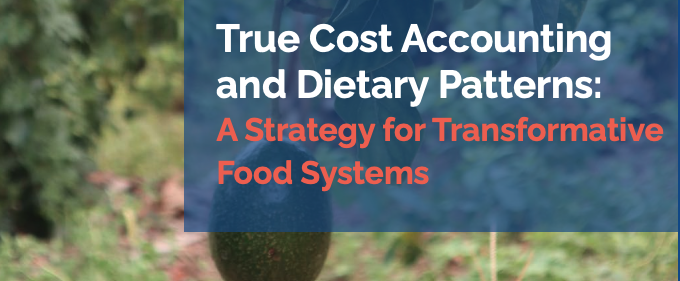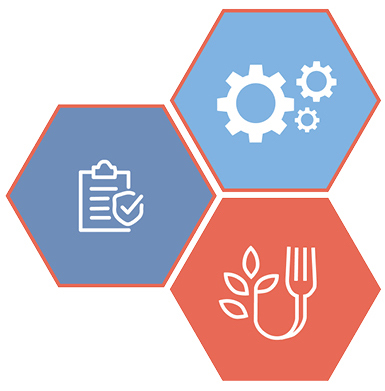A lot on our plate: Dietary patterns as a starting point for the sustainable transformation of food systems
Using the innovative methodology of True Cost Accounting (TCA) — and building on an analysis of current as well as desired future dietary patterns — to guide policy development and actions.
by Harry Stopes and Wangu Mwangi | 2022-02-03

Profound transformations are needed to meet the many challenges the world faces. On the one hand, we need to transcend Paris Agreement targets for cutting emissions if we are to stay below planetary limits. But we must simultaneously step above the floor of economic and social entitlements set out in various global agreements, such as the Sustainable Development Goals. At present we are on track to meet neither of these two vital sets of objectives.
Faced with such systemic challenges — where every area of life is implicated — where do we start? A group of experts (information below) in sustainable food systems argue that we should start by examining what’s on the world’s plates and bowls. Building on analysis contained in a report produced by TMG for the Worldwide Fund for Nature, their paper proposes using the innovative methodology of True Cost Accounting (TCA) — and building on an analysis of current as well as desired future dietary patterns — to guide policy development and actions.
From a too-casual glance it may seem counterintuitive to propose food systems as a starting point for building a more sustainable world or mitigating the effects of climate change. After all our current agri-food systems are profoundly unsustainable. They cause massive soil and land degradation, water pollution, release a significant proportion of methane and other harmful greenhouse gases, and accelerate biodiversity loss. Moreover, the agricultural sector accounts for a disproportionate share of sub-living wages and high-risk jobs. Hence, one might ask, aren’t food systems part of the problem?
Food systems as the fulcrum, TCA as the lever
Yet it’s their role in so many environmental challenges, as well as their obvious centrality to the right to food and hence human survival, that makes food systems, and dietary patterns, such an obvious starting point for triggering transformative change. Around 31% of human-caused GHG emissions originate from agri-food systems, with emissions from the transportation and processing of food along long and often-complex supply chains overtaking those from agriculture itself in many countries. Underpinning the world’s food systems are the world’s diets. Dietary patterns expose all the positive and negative externalities of our food system in one place, providing a framework for comprehensive analysis.

If food systems are the fulcrum, the lever which will force a holistic and transformative food system policy agenda into being will be True Cost Accounting (TCA). The paper argues that TCA, an integrated measurement approach that incorporates all four capitals — natural, human, social, and produced — can be used to track entire supply chains to better understand the full external costs of a food product or process. Both negative costs, such as GHG emissions, and positive effects, such as the capturing of carbon in soil, can be identified with TCA, which can also be used to identify externalised costs in terms of human welfare, rights, and security. TCA therefore makes it possible to more precisely identify those changes that need to be made in order to deliver nutritious, socially just and environmentally sustainable global food systems.
What should be our first steps?
Over 100 countries already have national dietary guidelines. Yet only a handful currently incorporate environmental sustainability targets, and most are minimally connected to agricultural or supply chain policy. As a result, they have far fewer food system impacts than they could. For example, although we know that humanity should, on average, approximately double its intake of fruits and vegetables there is very little agricultural policy that preferences their production and distribution. At the same time, many policies that support the production and distribution of animal products, measures that make the 1.5 degree target a distant prospect. No country has a liveable wage mandate in any of its policy.
TCA itself will be more effective when applied to food systems in a comprehensive, holistic way. Up to now it has predominantly been used to help improve the sustainability of individual private sector products or supply chains. One producer might seek to identify the overall best way to grow its bananas, for example. These strategies do not pose broader questions, such as whether particular product(s) or sectors should be supported in policy at all, when they are fundamentally destructive of the environment and/or strongly associated with increased human morbidity or mortality.
To return to the example of fruits and vegetables, we know that average figures don’t tell the whole story. Some people eat much more meat than others: those that do typically account for greater GHG emissions, and there is usually an inverse relationship between a person’s consumption of meat and how much fruits and vegetables they eat. Thus policy shouldn’t be aimed at promoting fruit and vegetables only, but should be geared towards a healthier dietary pattern overall with a doubling of fruit and vegetable consumption, and a reduction in meat consumption.
Challenges and opportunities
Possible avenues for further research and policy development are already clear. By analysing the impact of distance to market, we could quantify the possible savings in transport costs of shorter supply chains. Since shorter supply chains are more easily electrified, the use of renewable, rather than fossil, fuels for transportation then becomes easier to achieve. Production closer to the place of consumption would in turn support greater natural resource circularity, including the use of waste as inputs for the next cycle of production and distribution. In this sense, applying TCA along a food supply chain implies a host of policy opportunities.

Within the food system we can shift to renewable energy while also drastically reducing the incidence of air pollution-related diseases; markedly improve water quality across the globe; boost human and planetary health; ensure liveable wages throughout supply chains; advance gender and racial equity while expanding opportunity and meaningful work; and stop the decline of biodiversity. The potential multiplier effect of TCA also provides a wide range of opportunities for managing the inevitable trade-offs among economic, environmental, and social demands.
But we must close on a note of caution. Transforming food systems requires addressing multiple (and sometimes contradictory) goals simultaneously. Strong governance structures are necessary for managing this complexity. Dietary pattern-based public policy, utilising True Cost Accounting, can be a key tool. Just as fossil energy must be phased out by closing coal mines and disrupting CO2-heavy value chains, the transformation of the food system must be total. We cannot simply tinker with the 20th century model.
The working paper “True Cost Accounting and Dietary Patterns: A Strategy for Transformative Food Systems” has been written by Michael W. Hamm, Ph.D. — C.S. Mott Professor of Sustainable Agriculture, Michigan State University; Alexander Mueller, Managing Director, TMG-Think Tank for Sustainability; Olivia Riemer, Research Associate, TMG-Think Tank for Sustainability; and Kathleen Merrigan, Ph.D. — Kelly and Brian Swette Professor of Sustainable Food Systems, Arizona State University.
Photo by @ja_ma on Unsplash
 Urban Food FuturesFeb 09, 2026
Urban Food FuturesFeb 09, 2026Pushing the horizon: Urban farming and community-led innovation in Mukuru informal settlement
A small community-run greenhouse in Mukuru is offering insights into how controlled-environment agriculture can strengthen food security in urban environments under increasing pressure—and a look into the future of food systems in informal settlements.
Christian Sonntag, Emmanuel Atamba, Lumi Youm
 Land GovernanceDec 18, 2025
Land GovernanceDec 18, 2025Land tenure, women’s land rights, and resilience: Reflections from CRIC23 toward UNCCD COP17
Our experts discuss what the exchanges at CRIC23 highlighted and revealed about the role of secure and gender-equitable land tenure in the UNCCD's work ahead of the 2026 triple COP year.
Frederike Klümper, Washe Kazungu
 Urban Food FuturesDec 09, 2025
Urban Food FuturesDec 09, 2025The story of Mukuru's Urban Nutrition Hub
In Mukuru informal settlement, a safe haven for women has grown into the Urban Nutrition Hub, a multi-purpose space for nutrition education, training, and community development, demonstrating the potential of grassroots community-owned innovation..
Serah Kiragu-Wissler


